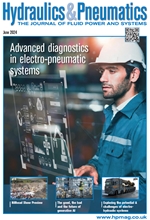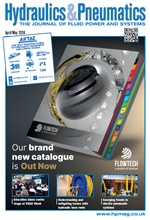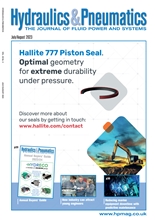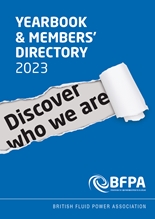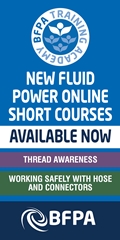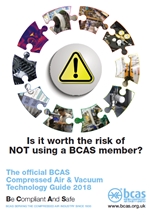The NFPC – widening the training remit (May 09)
Hydraulics & Pneumatics spoke with John Savage, director of the National Fluid Power Centre, and Richard Sharpe, the centre’s controls and automation manager, about the growing requirement for a more systems-based approach to technical training.
The world of fluid power is changing. Consider the way hydraulic systems are becoming no longer just hydraulics and pneumatics systems but systems that are increasingly likely to include an electronics and controls element. “This direction is being pushed on a number of fronts; from that of performance, health & safety, legislation, and so on – and this is occurring both on the industrial and mobile sides of the business,” said John Savage of the National Fluid Power Centre (NFPC). “This means that there are different knowledge and skills sets that people need to require in order to maintain, manage and even design these modern systems.”
And there are, of course, also the people who are involved in the sales side of systems. “At one time a person would talk to a potential customer and would sell a hydraulic solution or a pneumatics solution; now it is likely to be a systems solution,” remarked Savage. “We know now that with the drives side of the business that not everything is being looked at as hydraulics anymore.”
Holistic approach
The NFPC’s Richard Sharpe added that the days of the single-skill engineer are numbered. “Many companies that sell a range of products are saying that if the customer wants an electronic drive, PLC, direction control valve or a pressure release valve that’s what they can supply. So there’s definitely a push towards taking a more holistic point of view, whether it’s from a sales, design, health & safety or legislation perspective. We’ve all got to take a bigger, wider view and ask ourselves how do we meet this legislation, and how do we satisfy the needs of the customer, solve the problem that the customer has or find a solution to this engineering challenge. I think the days are probably gone when you could say it could be a hydraulic solution or an electronic solution or pneumatic solution; it’s now simply an integrated solution.”
Savage added that the NFPC has come a long way from being a traditional hydraulics organisation. “For many years we have provided good-quality hydraulics training courses, but even now when our staff go into the field to develop bespoke training courses we would be very much cutting our throats as regards business if we didn’t take a systems approach,” he said. “Imagine us saying to an OEM well that’s fine, we’ve done the hydraulics and they say to us what about the electronics, what about the control, what about the engine management systems – while we reply that’s nothing to do with us.
These machines often get sent all over the world, so if there is a problem with a machine in France some companies ask themselves do we send a hydraulics person, and electronics person, an engine management person or a software person – or do they send all four; they must start thinking differently. The four people may well be part of a team and may well be ready to support the individual that’s being sent to do the job, but the person who’s going definitely needs enough knowledge to be able to talk his way through those four systems. And, of course, if he has to relay information back to his team, he needs to be able to make sense of it all. These people are in danger of being moved out of their comfort zone. However, with proper training they can be moved back into a comfort zone in small bite-sized pieces. The NFPC has introduced a range of electro-hydraulic courses that progressively become more intense, but which lead trainees towards the bespoke side of the business.”
Crossing boundaries
The NFPC is working closely with the Drives & Controls Division of Bosch Rexroth in Cirencester. Also, Sharpe has spent the past six months realigning the NFPC’s fluid power laboratory to become more of a systems laboratory. In the provision of new and expanded facilities, the NFPC team has installed a CANopen network around the whole workshop. Sharpe explained that the reason the centre chose CANopen was mainly because it is an open protocol. “It’s not owned by any single company and therefore not only crosses many boundaries from one manufacturer to the next, but also crosses the boundaries from the industrial sector into the mobile sector,” he said. “These days, CAN is ubiquitous in automotive and also very much so in excavators and tractors etc. We’ve chosen a CANopen network because we can install equipment on that network from many different manufacturers. At the moment, we have a Danfoss inverter drive, which is very much an industrial product. We also have two Mitsubishi PLCs, also very much industrial products. And soon we will add the Parker IQAN and the Sauer Danfoss Plus 1 onto that same network to show that we can interface from all different manufacturers and all different sectors.”
Savage envisages that, with time, there will be more electrical drive control systems at the NFPC. “This is bound to move into our training programmes in what we can offer, but I think the key to all this, and what closes the circle, is that people from companies such as Bosch Rexroth and Parker etc. are providing a whole solution, and that solution is a power & motion control solution, not simply a fluid power solution.”
John Savage: There are different knowledge and skills sets that people need to require in order to maintain, manage and design modern systems.
Richard Sharpe: The days of the single-skill engineer are numbered.
Events
-
Smart Manufacturing & Engineering Week
05 - 06 June, 2024
NEC, Birmingham -
HILLHEAD 2024
25 June, 2024, 9:00 - 27 June, 2024, 16:00
Hillhead Quarry, Buxton, Derbyshire UK



